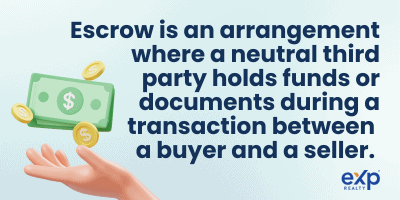Homeowners usually encounter the term escrow when purchasing or selling a property. But what is escrow in real estate? In summary, escrow refers to a process where a neutral third party holds funds or documents related to a real estate transaction until all the conditions of the sale agreement are met.
Escrow can help protect both the buyer and the seller from potential fraud, mistakes, or misunderstandings during the transfer of ownership. This blog post will explain what escrows mean in real estate, how it works, and their benefits and drawbacks.
Whether you’re a seasoned investor or a first-time property buyer, having a firm grasp of escrow may guide your choices and ensure a more seamless transaction when selling or buying real estate wherever you are.
What Is Escrow in Real Estate?

Escrow is a term used in real estate to describe a process where a neutral third party holds funds or documents during a transaction between a buyer and a seller. They can use the escrow procedure to confirm that all agreement terms have been met. Also, it safeguards both parties from fraud and risks.
In real estate, an escrow agent, also known as an escrow holder, is typically a licensed and regulated professional who acts as a neutral third party to facilitate the transaction process. The escrow holder or agent does not represent either the buyer or the seller but serves as an intermediary to collect and hold the funds and documents until all the requirements of the sale agreement are fulfilled.
The escrow company ensures that the terms of the sale agreement are followed while providing security for both parties. Escrow companies reduce the risk of fraud or misrepresentation for the buyer by guaranteeing that the money will only be delivered when the seller has complied with their obligations. Escrow lowers the seller’s non-payment or default risk by ensuring they will only receive the money after the buyer has complied with their obligations.
Overall, escrow is essential to the real estate process and deals because it offers a safe and effective mechanism to transfer ownership and money while lowering the likelihood of problems and conflicts.
How Does Escrow Work in Real Estate?
The escrow process usually starts when the buyer and seller sign a purchase agreement. The agreement outlines the property’s sale price, deposit amount, closing date, and contingencies or conditions.
Once the purchase agreement is signed, the buyer usually deposits an earnest money check or wire transfer with the escrow provider, demonstrating their good faith intention to purchase the property. The earnest money deposits are typically held in an interest-bearing account until the closing, when they are credited towards the purchase price or returned to the buyer if the sale falls through.
An escrow agent begins the transaction process by collecting and reviewing all the necessary documents and funds from the buyer, seller, and other parties involved, such as lenders, title companies, or attorneys. The escrow agent also ensures that all the conditions and contingencies of the sale agreement are met, such as reviewing a clear title search, completing any repairs, or obtaining necessary permits.
The Escrow Procedure
The buyer, seller, and escrow agent will communicate and exchange information, updates, and requests during the escrow procedure. The escrow agent will also prepare and coordinate the closing documents, which include all the funds stated in the mortgage agreement and real estate contracts like insurance fees, purchase funds from mortgage loans, and other closing payments.
Once all the conditions are met, the escrow agent releases the funds and documents to the respective parties, and the transaction is complete. The escrow agent may also provide post-closing services, such as disbursing any remaining funds, recording the deed, or issuing a homeowners insurance policy.
Ultimately, the escrow procedure is a complicated, strictly regulated system that necessitates the professionalism and knowledge of a certified and knowledgeable escrow agent. By using escrow, the parties can ensure a smooth and secure transaction process that protects their interests and rights.
Advantages of Using Escrow in Real Estate

Using escrow in real estate transactions can provide several advantages to both buyers and sellers. Here are some of the main benefits:
Protects Buyer and Seller
Escrow provides a neutral third party that can hold funds and documents, which helps to protect both the buyer and the seller from fraud, scams, or disputes. By using escrow, the parties can ensure that their interests and rights are protected and that all the conditions and contingencies of the sale agreement are met before the funds and documents are released.
Ensures a Smooth Transaction Process
Escrow can also help to ensure a smooth and efficient transaction process by providing a centralized and organized system that manages the flow of funds and documents, coordinates the communication and updates between the parties, and resolves any issues or discrepancies, such as late payments that may arise during the buying process.
Helps in Avoiding Disputes
By providing a clear and open framework that outlines each party’s roles, obligations, and expectations, using escrow can also aid in preventing disagreements and conflicts between the parties. Escrow can also help to identify and resolve any issues or discrepancies before they become significant problems that could delay or derail the transaction.
Provides a Secure and Confidential System
Providing a secure and confidential system is an advantage in escrow because it helps to protect the parties’ sensitive information, such as personal details, financial transaction data, and documents.
The parties can be guaranteed that their information is kept private and isn’t shared or accessed by unauthorized parties using a trustworthy and encrypted system. Identity theft, fraud, and other security breaches that can harm the parties’ finances or reputations can be avoided with the help of this.
Ensures Compliance With Legal and Regulatory Requirements
Ensuring compliance with the legal and regulatory requirements of the transaction is an advantage in escrow because it helps to mitigate legal risks and ensures that the transaction proceeds smoothly and lawfully.
By ensuring compliance with these requirements, the escrow agent can help to prevent legal disputes and potential penalties, which could impact the transaction and the parties’ interests. Moreover, since the parties are confident that the transaction is being carried out transparently and equitably, compliance with legal and regulatory standards can foster trust between them.
Using escrow in real estate transactions can benefit buyers and sellers by protecting their interests, ensuring a smooth purchase process, and avoiding disputes or mistakes.
Disadvantages of Using Escrow in Real Estate

While using escrow in real estate transactions can offer several benefits, there are also some potential drawbacks or risks. Here are some of the main disadvantages of using escrow:
Delays in the Process
Escrow can occasionally lead to delays in the transaction process, which is one of its main drawbacks. This may occur if problems or unforeseen circumstances must be fixed before the escrow money is released or the deal is closed. For example, if the buyer’s financing falls through or there are any title defects or property liens that need to be cleared, this could delay the transaction and keep the funds in escrow for longer than expected.
Miscommunication Between Parties
The use of escrow may occasionally result in misunderstandings or improper communication between the parties, which is another possible drawback. This can happen if the parties need to fully understand the escrow process, their roles, responsibilities, or the timeline and conditions of the transaction. This can cause frustration, delays, and disputes that could have been avoided without more transparent and frequent communication.
Mismanagement of Funds
Using escrow can also expose the parties to the risk of mismanagement of funds by the escrow agent. There have been cases where escrow agents have misappropriated funds, committed fraud, or made mistakes that resulted in financial losses for the parties. However, escrow agents must follow specific legal and ethical standards and are usually bonded or insured.
Restrictions on the Parties’ Flexibility or Control Over the Transaction
In an escrow arrangement, the parties typically must follow a set process and timeline, and any changes or deviations may require the consent of all parties involved, including the escrow agent. This can restrict the parties’ flexibility to adjust the transaction terms, such as the purchase price, the closing date, or the contingencies.
This can restrict the parties’ flexibility to modify the transaction terms, such as the purchase price, the closing date, or the contingencies. The parties may also have to ask the escrow agent’s permission or take further legal action to settle any disagreements or problems during the escrow procedure, which can further restrict their influence over the transaction.
Even though using escrow in real estate deals might have a lot of advantages, it’s crucial to be aware of the dangers and disadvantages that could arise. Working with a trustworthy and knowledgeable escrow agent, carefully reading and comprehending the terms and circumstances of the escrow agreement, and maintaining open and transparent communication with all parties involved in the transaction are all advised in order to reduce these risks.
Key Takeaways
In summary, escrow is a neutral third party that holds funds or documents during a real estate transaction to ensure that all conditions of the sale agreement are met before the transaction can be completed.
Escrow offers a safe and orderly system that ensures adherence to legal and regulatory standards, lowers the chance of fraud, mistakes, or conflicts, and protects both the buyer and the seller in a real estate transaction. Escrow use can, however, have drawbacks, including potential delays, miscommunication between parties, and limitations on the parties’ flexibility or control over the transaction.
Escrow offers a dependable and trusted structure that can assist in reducing risks and fostering trust between the parties, making it a crucial part of a successful real estate transaction. By using escrow, both parties can be sure that a transaction is handled fairly and efficiently. The parties’ interests are also protected at all times.
Are you looking to understand escrow in real estate further? Contact a local real estate agent from eXprealty today! Our experienced real estate agents can guide you through the escrow process and help you find your dream home. Sign up on our website to get alerts of new listings as soon as they come on the market. Start your home-buying journey today expressly.
FAQs: What is Escrow in Real Estate
Here are the frequently asked questions related to escrow.
What does escrow mean in simple terms?
In simple terms, escrow is a legal arrangement where a third party temporarily holds assets, usually money or property, on behalf of two parties, the buyer and the seller, involved in a transaction. Before releasing the assets to the intended recipient, the third party, also called the escrow agent, is in charge of ensuring that the transaction’s terms and conditions are met.
What does it mean to be in escrow for a house?
To be in escrow for a house means that a neutral third party, called an escrow agent, holds the funds and documents related to a real estate transaction until all conditions of the sale agreement are met.
How does escrow work for dummies?
Escrow uses a neutral third party, an escrow agent, to hold funds and documents related to a real estate transaction. The escrow agent ensures that all conditions of the sale agreement are met, such as verifying the title, completing inspections, and satisfying legal and regulatory requirements.
Can a house fall out of escrow?
The house may fall out of escrow if one or both parties do not adhere to the terms of the selling agreement. For example, the buyer can only secure financing or undertake the required renovations if the seller does.
Who owns the money in an escrow account?
In an escrow account, the buyer typically owns the money held in escrow. This is because the buyer usually deposits the funds to secure the purchase of a property or service.
Is being in escrow a good thing?
Being in escrow can be good, as it provides a secure and neutral process for completing a real estate transaction. Ensuring all sale agreement terms are satisfied before the transaction is finalized safeguards both the buyer and the seller.
What not to do during escrow?
Avoiding any actions that could potentially jeopardize the transaction during escrow is essential. This includes preventing major purchases, opening new lines of credit, or changing employment or financial status. To avoid delays or misunderstandings, it is also crucial to communicate honestly and immediately with the escrow agent and other parties engaged in the transaction.
How much money should you have in escrow?
Generally, lenders require homeowners to maintain an escrow account that covers around 2-3 months’ worth of expenses, including property tax payments and insurance premiums like mortgage insurance or homeowners insurance.
How does escrow protect the buyer?
Escrow protects the buyer by ensuring that all conditions of the sale agreement are met before the transaction is completed. The escrow agent acts as a neutral third party who holds funds and documents during the transaction, ensuring that all parties meet their obligations.
This helps prevent fraud and other issues that could harm the buyer. Additionally, escrow helps to ensure a smooth transaction process and can help the buyer avoid disputes.
Does paying off escrow lower your mortgage?
Your monthly mortgage payments do not directly decrease when you pay off escrow. However, paying off any overdue bills being covered by the escrow account, such as delinquent property taxes or insurance premiums, can lower the amount of money that will ultimately be needed in the account.
How long can the money be held in escrow?
Depending on how long it takes for all requirements of the sale agreement to be fulfilled, the period that money can be held in escrow may be open for one to many weeks.
What happens to money held in escrow?
The funds kept in escrow cover closing costs, property taxes, insurance payments, loans, and other transaction-related expenditures. Any remaining funds in the escrow account are typically returned to the parties involved once all sales agreements are met.
What are the pros and cons of escrow?
Pros of the escrow include protecting both parties in a transaction, ensuring compliance with legal and regulatory requirements, and offering a secure and confidential system. Cons of the escrow include restrictions on the parties’ flexibility or control over the transaction, potential delays in the process, and mismanagement of funds.
Is escrow safe for sellers?
Escrow can be a safe option for sellers using a reputable and trustworthy escrow service provider. It’s essential to exercise caution and verify the provider’s credibility beforehand. Escrow may only be necessary or practical in some situations, especially if the parties already have an established relationship or the monthly payment amount is relatively small.
Is escrow safe for buyers?
Escrow protects the buyer’s funds and reduces the risk of fraud and other issues arising during the transaction process. Escrow protects buyers by holding funds until they receive the item or service described in the transaction agreement.





